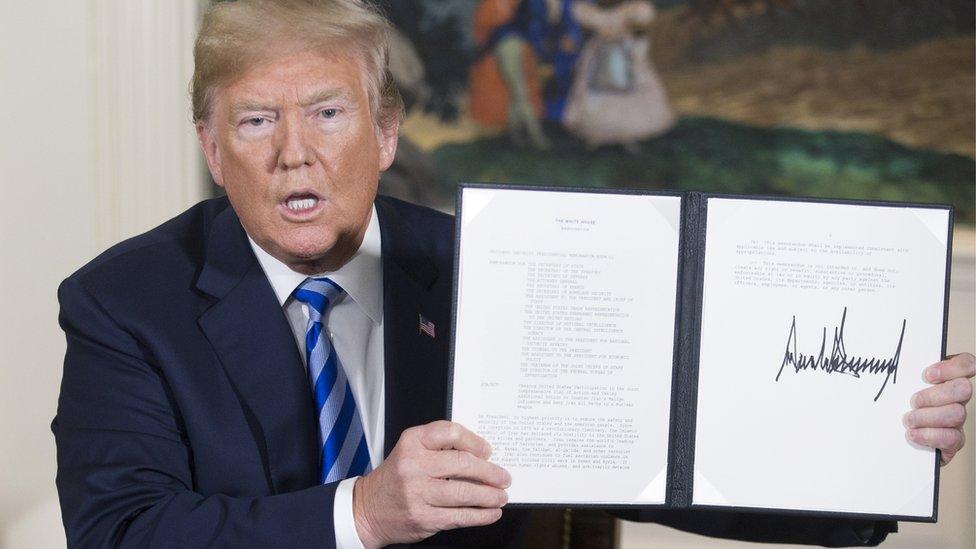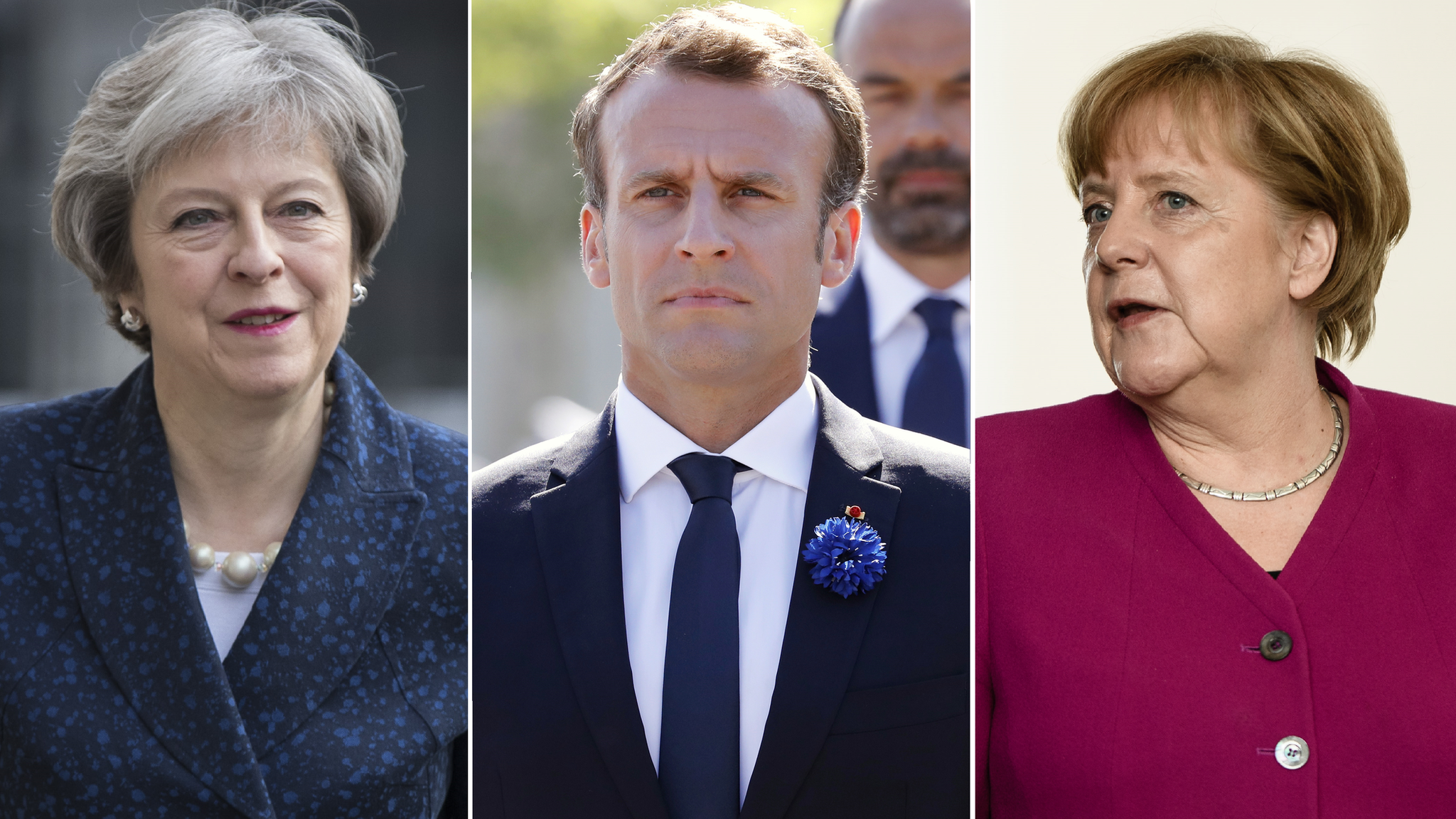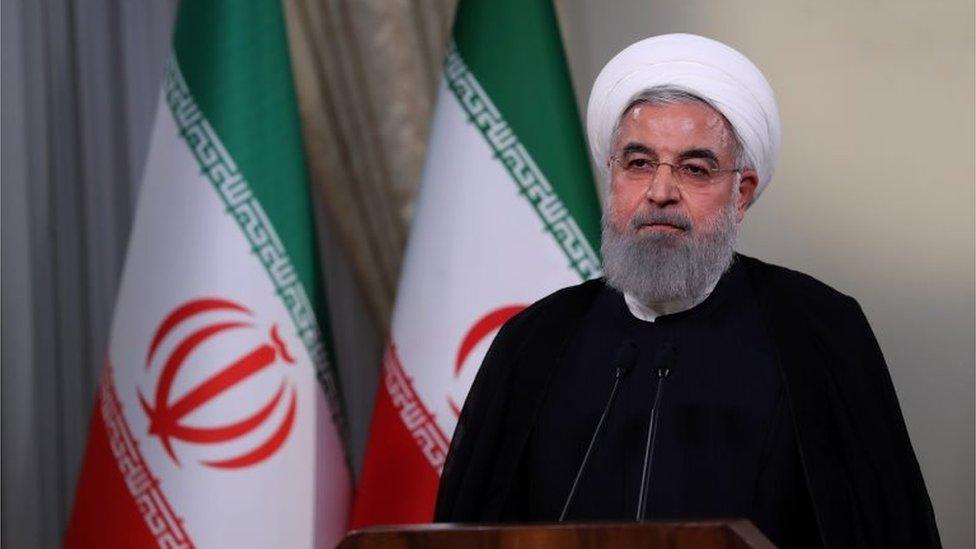Iran nuclear deal: Winners and losers from Trump's decision to quit
- Published

Mr Trump signed a memo triggering a countdown to the implementation of Iran sanctions
US President Donald Trump's decision to withdraw the US from the Iran deal threatens to scupper international efforts to constrain Tehran's nuclear ambitions.
His move to reimpose sanctions on the country could have consequences that reach far beyond Iran. So why is the US walking away from the accord without a Plan B? And who are the winners and losers in all of this?
Iranian president: Loser
President Hassan Rouhani, who is regarded as a moderate and a reformist, agreed to curb Tehran's nuclear programme in exchange for easing of economic sanctions. He hoped this would improve international relations as well as living standards for ordinary Iranians.
The move put him at odds with the country's hardliners who viewed his developing relationship with western powers with suspicion. But Mr Rouhani's re-election, by a landslide, a year ago signalled that many Iranians backed his vision.
President Rouhani on US decision: 'Iran will wait and see how others react'
Now, with the threat of new sanctions being imposed by the US, Mr Rouhani is in danger of appearing to have failed and is likely to be blamed by the hardliners for any renewed hardships suffered by the Iranian people.
Iranian hardliners: Winner
Meanwhile Iran's hardliners, who were against entering any sort of agreement with the US, have been celebrating.
They have long accused Mr Rouhani and his government of surrendering too many of Iran's rights to the West as part of the nuclear deal.
Some of his detractors are influential. They include the powerful Revolutionary Guards as well as conservative members of the clergy and the ruling elite.
These hardliners may now use Mr Trump's decision to push for a tougher stance from Mr Rouhani or seek to have him replaced by someone who will pursue one.
Iran's economy: Loser
The US decision is unlikely to attract big business to the Iranian market.
Sanctions on Iran's energy sector will also hit the country's oil exports, which are a major source of revenue.
Iran's economy was lifted from a recession following the implementation of the nuclear agreement and the removal of economic sanctions but remains sluggish.
Ordinary Iranians also say they have not felt any positive impact in their day-to-day lives.
It is difficult to calculate the impact of another hit to the Iranian economy and the knock-on effect to its citizens. Some argue that the sanctions will target the people, not the politicians.
Israeli PM: Winner
Israel's Prime Minister Benjamin Netanyahu has been a vocal critic of the deal, which he says fails to provide adequate safeguards against a weapons programme. He was in favour of the US exiting the agreement.
A recent presentation he gave discrediting the accord was cited in Mr Trump's announcement on Tuesday.
Mr Netanyahu has repeatedly argued that the agreement is flawed because Iran is not a reliable partner and has "lied" about its military nuclear programme.
Mr Netanyahu unveiled what he claimed to be Iran's secret atomic archive
Israel sees Iran's influence in the Middle East as the "greatest threat to our world".
The US decision highlights the strong relationship between Mr Netanyahu and Mr Trump, and will serve as their warning to Iran that the nuclear issue must be addressed for the longer term.
However the deal was - according to its European signatories - working in its aim to curb Tehran's nuclear programme, and without a "Plan B", they argue, there is no incentive for Iran to stick to its commitments.
US president: Loser/Winner
Mr Trump warned in January that he would abandon the deal unless it was amended to include permanent restrictions on Iran's uranium enrichment.
Under the terms of the current deal, Iran agreed to limit production for 15 years.
Analysis: What's next for the Iran deal? Barbara Plett Usher explains
However the move by the US president does nothing to address this concern, and is likely to have a detrimental effect on bringing Iran back to the negotiating table with the US.
Iran's supreme leader, Ayatollah Ali Khamenei, said of the decision: "I said from the first day: don't trust America."
Some Iranian citizens have also taken to social media to accuse the US of being deceptive and dishonest.
However opinion polls show that a majority of Americans were in favour of sticking with the deal, external, and refusing to do so has put US diplomacy on a collision course with some of Washington's closest allies.
Despite this, having repeatedly threatened to pull out of the deal, Mr Trump was able to state during his announcement: "When I make promises, I keep them."
Europe: Loser
French President Emmanuel Macron, German Chancellor Angela Merkel and UK Foreign Secretary Boris Johnson had spent weeks lobbying Mr Trump to remain committed to the deal.
As such, the result could be considered a diplomatic failure of the European countries who had worked for years to negotiate and implement the agreement.
The EU also has economic interests in maintaining the deal. It was once Iran's largest trading partner and its economic endeavours have only strengthened under the accord.
Last month, Iran made the euro its official reporting currency instead of the dollar, pointing to increased tensions with the US.
Saudi Arabia: Winner
Saudi Arabia was among the first to welcome Mr Trump's decision.
The country considers Iran a regional rival and is hugely concerned about the nation's growing influence in Iraq, Syria, Lebanon and Yemen.
Iran and Saudi Arabia have long been locked in a battle for regional control but tensions have escalated between the two nations in recent months.
Saudi Arabia's young crown prince, Mohammed bin Salman, has long opposed the agreement and mounted a quiet lobbying campaign to kill it.
Iran and Saudi Arabia represent the two main opposing sides of a 1,300-year schism in Islam, between the Sunnis and Shias.
- Published9 May 2018

- Published8 May 2018

- Published4 May 2018
